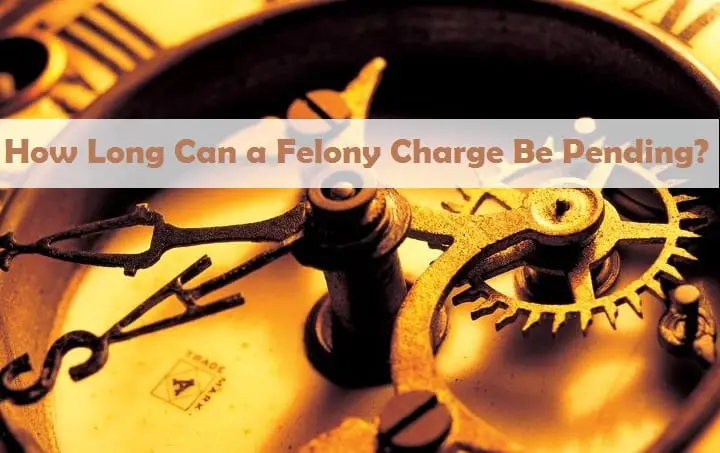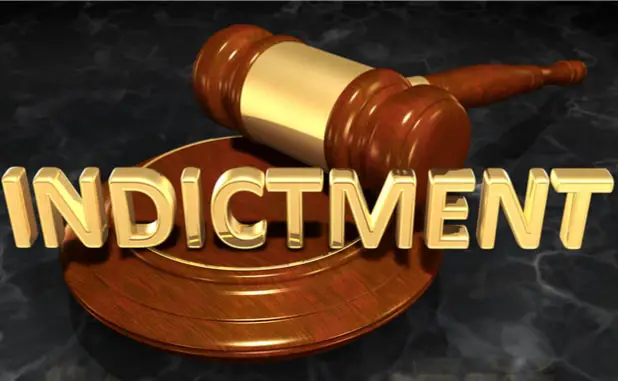How Long Can a Felony Charge Be Pending? A felony charge can remain pending for different amounts of time depending on the crime and where you are. However, there are 5 main ways in which a felony is kept pending, which we will explore now.

This can be difficult for those who are wanting to maintain or get new jobs and have to deal with having a pending mark appear on their background check. Here’s what to expect if you are facing a felony charge and are awaiting your trial.
How Long Can a Felony Charge Be Pending?
- A felony arraignment
- A felony indictment
- Entering a Plea
- Statute of Limitations
We will also cover a few ways in which to ensure that the pending mark is quickly dealt with.
Felony arraignment
You have a right to a quick trial shortly after you are charged. This is a right given to you by the Sixth Amendment, so make sure that you have the proper legal support to make sure this happens. For a variety of reasons, sometimes crimes can go “missing in the system”, which can be just grounds for having your case dismissed.
After being charged, you should have an arraignment brought against you within 48 to 72 hours. Nothing at this point says you are guilty, but as you are being charged, you will have a pending sign appear on any background check.
At this point, you will be asked to enter a plea of guilty or not guilty. You should always consider legal advice before entering a plea, especially taking time to consider how a not guilty plea will look to a jury that will find you guilty. Your lawyer is there to get you the best result they can, so make sure that you are fully aware of how best to enter.
If this arraignment does not happen within the space of a few days after your arrest and charging, then you may have grounds to have the case thrown out of court. If this waiting period has been considered unreasonable by a judge, ask your lawyer to appeal against the case.
If the appeal is successful, you can walk away a free man or woman and the pending mark will disappear from your record – the arrest may not, however, so be aware of that for future job applications.
In regards to a felony arraignment, a pending felony charge can last up to a few months depending on whether the case is brought to court in due time. After this point, you are either being charged formally or you are free.
Felony indictment

When you have been charged, the arresting officer will hand over a written accusation to the judge that is dealing with your case. This will detail your alleged crimes and any details that an investigation has surmounted against you.
This document will be read by the judge and the legal teams before the arraignment. This is a pending period in which all parties have the right to prepare a case challenging or using the evidence brought by the police department.
As this is used in an arraignment, you technically do not need to enter a plea of guilty or not guilty if you are accused of committing a serious crime (defined in the Fifth Amendment as being capital or otherwise infamous crime). You can demand that you have a Grand Jury sitting in for your case so that you are judged by a jury of your peers. Asking for a Grand Jury opens the case to a full judgment that will lead to a final court case where final sentencing can be given.
If the Grand Jury decides that you have enough evidence stacked against you, they will submit a true bill – this true bill is the go-ahead that they need to open the case formally with a court that can sentence you. If they do not have enough evidence to submit a true bill, a no bill will be submitted instead – this is the end of the charge as it states that not enough evidence has been brought against you to warrant taking the case to a formal court.
If you are given a no bill, the pending mark will disappear from background checks. However, asking for a Grand Jury to preside over your case will extend the time of the court case to a much further extent than if you proceed with a single judge.
If you believe that you have a good chance of showing that you did not commit the crime or that they do not have enough evidence against you, you may be best allowing the indictment to proceed without asking for a larger jury so that you can get back on with your life without waiting months for the pending felony charge to disappear from your records.
Entering a Plea
During the arraignment, you will be asked to enter a plea. We have already covered guilty and not guilty, but you can also enter a no-contest plea.
Entering a guilty plea for a felony charge, you are asking the judge to open up the next stage of the sentencing procedure – although minor crimes can be sentenced at an arraignment, felony charges generally cannot due to their seriousness.
If you are entering a not guilty plea, you are throwing the challenge to the prosecutors to prove that you did in fact commit a crime and that they need to bring evidence to charge you. This will extend the length of your pending time, but that is in the interest of having a fair trial and making sure that people properly consider your case.
If you are entering a no-contest plea, you can say that the prosecution has all the evidence it needs to show that you committed the crime but you are denying that you actually did it. This will be treated as a guilty plea by the courts.
When you have entered your plea, you will either be held on reprimand, allowed to go free without financial bail (unlikely in the case of a felony charge), or given the opportunity to get bail. All three of these situations will extend the period in which you are considering pending a felony charge.
As your trial date is set, you have to wait until your preliminary hearing to find out if you are able to escape your charge pending sign on a background check.
Statute of Limitations
Certain crimes can only be a charge within a certain timeframe – this can be very long for extremely serious crimes like child abuse or murder, but it is not always the way. If the court cannot bring a reasonable case against you during that time limit, you can walk away without charge.
The statute of limitations is important in American law as it means that someone can only be held for so long while the evidence is being prepared and eventually presented. If they cannot show that you committed a crime, then they have to let you go and the crime can no longer be brought against you.
Do note that the time for the statute of limitations does not apply if it is believed that the alleged criminal skipped the border into another state or is living as a fugitive.
